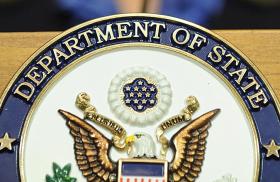The Bush administration has billed what would be the 18th Security Council resolution vote against Saddam Hussein as the "final opportunity" for both Iraqi compliance and the U.N.'s "moral relevance." This challenge to the U.N. may ring familiar. Last fall, President Bush dared the General Assembly to ignore 12 years of Iraqi weapons violations, "Will the United Nations serve the purpose of its founding, or will it be irrelevant?" And in the early 1950s the Truman administration similarly goaded the U.N. into action by dubbing North Korean aggression as "an attack on the United Nations itself."
As a public-relations strategy, confronting the U.N. with its own putative moral obligations makes perfect sense. But one thing is clear -- even if coalition forces end up fighting alongside a few blue helmets, the U.N.'s decision will not carry any moral weight.
During the Cold War, this fact went uncontested. The bipolar world paralyzed the Security Council as vetoes from either the Western or Soviet bloc came to be the norm. By 1955, the Soviet Union had thwarted the Council no fewer than 75 times. The U.N. was silent during the Cuban Missile Crisis and the Soviet invasion of Afghanistan, but these events were seen for what they were -- not morally ambiguous developments, but the reality of Cold War jockeying.
With the collapse of the Soviet Union, all of this was supposed to change. President George H. W. Bush spoke of a "New World Order," which would be dictated by international consensus based on universal norms.
On the surface, the 1991 Gulf War upheld this optimism. The so-called international community roundly condemned Iraq's unwarranted invasion of a sovereign country, and the ensuing war took place under the U.N. banner. Within a week, the pariah state had been brought to its knees. This was collective security at work.
Or was it? In retrospect, the real amazement is not that the world had changed, but that a transgression could ever enliven and rally such a disparate coalition of states.
The 1990s fed the illusion of a moral United Nations, but only if measured in terms the founders had never envisaged, such as in peacekeeping and nation-building exercises. On hard security questions, the U.N. remained -- at best -- a sideshow. It deferred to the world's superpower, dragged its feet until disaster had already struck, or did nothing at all. This was the story of Bosnia, Kosovo, and Rwanda.
Polling data consistently show popular support -- at home and abroad -- for a U.N. solution to the Iraqi problem. But if the Bush administration gives the Security Council one last chance for "moral relevance," member-states' perceived national interests will as always determine their vote.
Specifically, France's all-important vote would come down to its view of whether a "non" at the Security Council is the best way to restrain the "hyper-power" United States. On the one hand, France hopes vetoing a U.N.-sponsored war could prove its place on the Permanent Five as a counterbalance to American hegemony. On the other, France recognizes this plan could backfire -- if states subsequently write off the U.N. as a forum for conflict resolution. In light of the current wrangling within the Security Council, this is a distinct possibility.
The other key state is Russia, whose ambivalence has less to do with the moral basis of Iraqi regime change than the amount of cash a postwar Iraq would put in its pocket. As the chairman of the Russian foreign affairs committee recently put it: "There is an $8 billion state debt owed by Iraq to Russia, we have serious oil interests, and the Iraqi market is a major buyer of Russian goods. We need to hear a strong message from Washington that they understand our concerns in this area."
From Mexico to Cameroon, the same cost-benefit strategic analysis will determine the votes of the ten rotating Security Council members -- not eleventh-hour moral revelations, as U.N. enthusiasts seem to think.
"The United Nations is today an instrument through which its members try to protect and promote their respective national interests," the political scientist Hans Morgenthau pointed out almost 50 years ago. The U.N.'s position on the war will not make the war or the U.N. itself any more or less morally relevant. Yet if the U.N.'s decision contributes to keeping Saddam in power, it could well make the world more vulnerable to terrorist attacks. The final opportunity for moral relevance has long passed, but the U.N. may still be able to promote international peace and stability, starting in the Persian Gulf.
National Review Online


